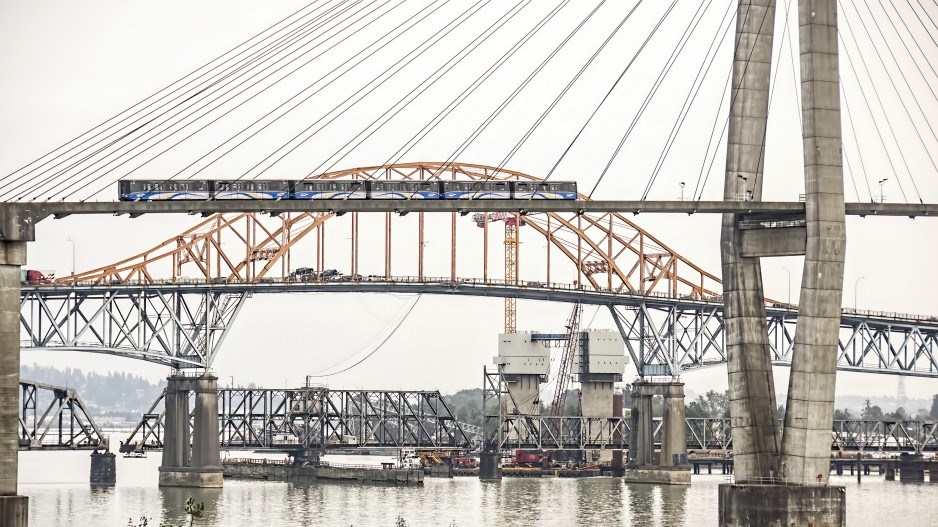Light rail versus SkyTrain was a top wedge issue Surrey Mayor Doug McCallum seized on to cut his path to victory in B.C.’s 2018 municipal elections.
With voters returning to the ballots next month, potential hot-button transportation issues such as the Broadway subway or the replacement for the George Massey tunnel are already settled with government dollars allocated and construction underway.
The prospect of mobility pricing – charging fees to motorists depending on the areas of Metro Vancouver they’re trying to access – requires regional buy-in. But the debate so far this election season has been limited to campaigning in the City of Vancouver, with ABC Vancouver mayoral hopeful Ken Sim accusing incumbent Mayor Kennedy Stewart last month of favouring tolls for motorists entering the downtown core. Stewart has denied the claim.
Conflicting policies on transportation haven’t been as sticky as politicians’ conflicting policies on housing. But a Sept. 8 survey commissioned by the Greater Vancouver Board of Trade (GVBOT) and conducted by the Mustel Group reveals it to be the top issue for voters after housing.
“This is something that is really very present in their [voters’] daily lives, and so I’m not surprised to see that as a key issue,” said Werner Antweiler, an associate professor with expertise in urban mobility at the University of British Columbia’s (UBC) Sauder School of Business.
This past spring, TransLink and the Mayors’ Council on Regional Transportation unveiled a series of 10-year priorities under a Transport 2050 plan. It includes doubling regional bus service levels, adding as many as nine bus rapid transit (BRT) routes on dedicated lanes, building a rapid connection to the North Shore and creating 450 kilometres of new cycling paths.
The addition of BRT, expansion of bus services and rapid transit to the North Shore have the support of between 71 per cent and 81 per cent of the general public, according to the GVBOT’s poll. Bike lanes have the support of 45 per cent of voters in the region.
Antweiler said the broad support of BRT (81 per cent) indicates how ubiquitous it has become throughout the region.
“[BRT] is something that is really predictable for users,” he said. “If you miss a bus, no worries, the next bus won’t be long behind. And so it’s … solving a key problem that otherwise is actually very expensive to solve.”
The 10-year plan comes as TransLink is projecting a $46.9 million deficit for the year, and, as of June, ridership sits at 72 per cent of what it was compared with pre-pandemic levels
TransLink said its goal is to have ridership at 80 per cent of pre-pandemic levels by the fall, just as voters go to the polls.
“The issues with COVID are, of course, putting a lot of strain on our public transit infrastructure,” Antweiler said. “Ultimately, we’re looking at population growth in our region. And if you experience population growth, we need transportation options that are not all relying on the car, because there’s only that much road space, and it’s getting more congested.”
But he said NIMBYism and opposition from established interests could still quash efforts to densify the region as part of the bid to build up transit infrastructure to better connect different cities.
Meanwhile, Sept. 8 polling from Research Co. revealed transportation did not crack the top three when it comes to issues voters in Vancouver care most about.
Housing, drug overdoses, crime, poverty and property taxes all rank higher.
Research Co. president Mario Canseco said the effects of remote working may have played a part in diminishing transportation as a top issue among voters.
“We don’t hear the significant complaints about going from one of municipality to the other or the difficulty to find a parking spot that we used to find before because a lot of people are just working from home and getting used to the idea of being at the office less often than they were before the pandemic.”
Ironically, Canseco added, the rallying point for regional unity may have come in 2015 when Metro Vancouver voters cast a majority No vote in a $7.5 billion transportation plan that would have ushered in an additional 0.5 per cent sales tax to fund major projects.
“They weren’t able to do it because people just don’t like to put price tags on stuff,” he said, noting the plan had broad regional support from mayors all over the political spectrum – but not their constituents.
“It’s a lot easier when you talk about billions of investment and it’s going to be paid for by the P3 systems [public-private partnership] or if the federal government gets involved and gives us some cash.”
But that doesn’t mean there’s not time for politicians to carve out wedge issues that have regional implications on transportation networks, according to Canseco.
For instance, the Broadway subway extension has been significantly disrupting traffic, businesses and residents along that corridor.
“The big thing that is coming … would be the expansion of the SkyTrain to UBC, and it hasn’t really been at the forefront of discussion,” Canseco said. “Nobody has said that they are vehemently opposed to it. At least not recently. So I think that’s one of the reasons for it to be dropping as an issue.”




